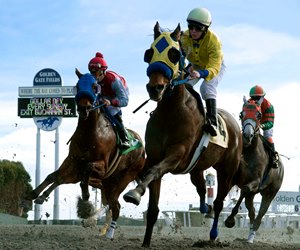Golden Gate to Close as Auxiliary Stable in 2018


Tim Ritvo is prepared to roll the dice in Northern California.
After the California Horse Racing Board meeting Nov. 16 at Del Mar, The Stronach Group's chief operating officer said, even though it might result in a significant loss to Northern California's Thoroughbred population, the current plan for the 2018 season is to shut down Golden Gate Fields as an auxiliary stabling facility for about two months of fair racing during the summer.
It would be a shift from business as usual in the region, where Golden Gate has remained open as a training facility when the circuit moves to fair stops at Pleasanton, Sacramento, Santa Rosa, and Ferndale.
"Yes. We will close, but will continue to negotiate if they want to negotiate with us," Ritvo said of the move, which would close Golden Gate from mid-June to mid-August and save an estimated $1 million to $1.2 million. "But from hearing (California Authority of Racing Fairs interim executive director Larry Swartzlander), he says he's not even interested."
Ritvo's comments after the CHRB session Thursday were in response to Swartzlander's statements during the meeting. Swartzlander said in October that Golden Gate is asking for $16,900 a day to provide auxiliary stabling, while he said the fairs can provide their own for $7,800 a day.
"CARF keeps getting kicked around (and) kicked around," Swartzlander said Thursday, during a discussion over a reassigned week of racing in 2018 that moved from Santa Rosa to Sacramento. "Let me make one statement about stabling. If I have 700 stalls at Pleasanton and I've got 1,100 stalls at Sacramento, why do I need Golden Gate?"
Earlier in the meeting, California Thoroughbred Trainers executive director Alan Balch called for the CHRB to take action on the "standoff" between the fairs and Golden Gate Fields.
"We are in desperate need of the racing board, whether it is the chairman or anybody he designates, to require the parties to come together immediately in the presence of one or two commissioners and address this very serious standoff," Balch said. "Because that's what we have. It's going to result in both sides—CARF and The Stronach Group—losing. More importantly it's going to result in a great loss to the horsemen throughout the state, but particularly in Northern California, and particularly the breeding industry."
Balch and Thoroughbred Owners of California president and CEO Greg Avioli raised the same concerns about the threat of losing horses because of the stabling issues at previous CHRB meetings this year.
"We have real concerns given the number of horses in the north right now, what the impact would be if they close Golden Gate for an extended period of time during the summer." Avioli said in October. "There will be a fair number of trainers who will leave and will not return."
The fact that Golden Gate has been open as a stabling facility for so long has allowed horsemen and their staff to put down roots in the San Francisco Bay Area's East Bay region. Ritvo said he has considered the impact of horses and horsemen who may relocate and never return, but is willing to take the risk.
"We've thought about that all along," the executive said of the potential lost horses. "The problem is, there's a horse population shortage (already). Will it get worse? How much worse can it be? We think people will come back and we're sorry any for inconvenience, but we have to make a good business decision.
"(The fairs) do have enough stalls, but the problem is, it's a disruption to people's lives. At the same time, it's a business, and why should we absorb those costs when we're not having any revenue? ... What they didn't consider is, do people really want to move around for two- or three-week meets?"
When asked if the move to close down Golden Gate for the two months in the summer was a strategic maneuver to squeeze the fairs out of business, Ritvo reiterated the financial aspects of the decision.
"There's no secret that I would want more dates (for Golden Gate)—and premium dates," Ritvo said. "It just happens that the way it lines up, and the fairs' position to not cooperate with the backside cost—it doesn't make sense to stay open.
"We always want more days, but to be docked for 60 days, just to stay open—it's insane. It's just bad business."
Ultimately the potential profitability for Golden Gate, a track Ritvo says is losing money, is paramount.
"It could make the difference between profitability and losing money," Ritvo said. "There is a risk that the horse population when we come back will not be healthy, but that's a risk we have to take."
